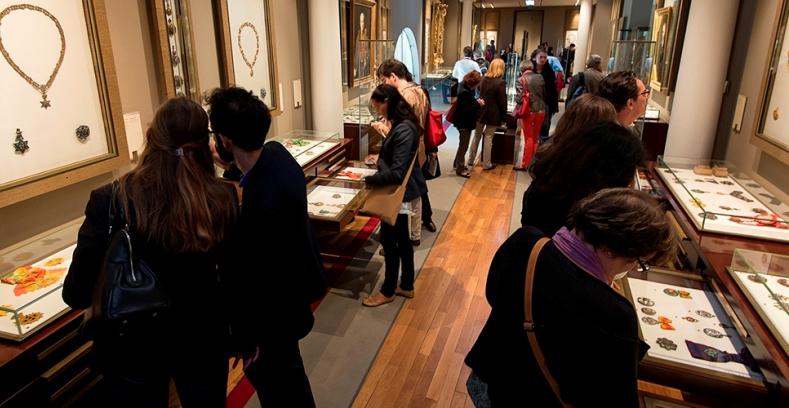
Visit
The room-by-room visit
After a brief introduction to the history of the palace and the museum, visitors explore five rooms displaying insignia, paintings, weapons, artifacts, costumes, documents, etc., and can stop to watch videos that evoke the lives of emblematic historical figures.
- Room of the religious and military chivalric orders: the Knights Hospitaller, also known as Order of Saint John or Order of Malta, Order of the Teutonic Knights, Order of the Holy Sepulcher, etc.
- Room of the royal orders: Order of Saint Michael, Order of the Holy Spirit, Order of Saint Louis, Order of Military Merit, etc.
- Room of the Legion of Honor: weapons of honor and reward, Legion of Honor, Order of the Iron Crown, Order of the Reunion, orders of the Emperor’s brothers, etc.
- The Mario Spada room for foreign orders: more than 400 orders from 122 former or contemporary countries.
- The contemporary room: awards from the French Revolution, the Restoration, the Second Empire (Military Medal and commemorative medals), and the two world wars…. The tour ends with medals of honor, colonial and ministerial orders, and the National Order of Merit, the second national order, founded by Charles de Gaulle in 1963.
Understand the museum’s collections: download fact sheets about the museum’s rooms and notes about works.
Admission and tours
1. Individual visitors and families
- Open Wednesday to Sunday, 1 to 6 p.m. (last admission at 5:30)
- Free admission
2. Guided group tours
Group visits are welcome.
Visits with a guide
- Guided tours for groups of adults with a lecturer approved by the museum
- 25 persons maximum
- Approximate tour time: 2 hours
- Price: 175 euros
3. Schools and holiday centers
The museum is for teachers and their students a privileged place to discover the history of France in an original manner. Every visit is consistent with the students’ curriculum in history, civics and art history.
From september to june the pedagogical service welcomes children from primary and secondary schools and holiday centers, in groups of 30 maximum (including accompanying adults). Please split up into several groups if you are more than 30.
Pedagogical material :
The teacher in charge can prepare for the visit using the museum’s resource materials
Three types of visits are offred :
Visits without guides
Free visits of the museum for teachers ans their students, from Tuesday to Friday, 9 to 5 p.m.
Booking : musee@legiondhonneur.fr
Guided tours
Concerned with cultural and artistic education, the museum offers guided tours consistent with the students’ curriculum in history, civics and art history.
A cultural mediator accompanies the children on a thematic discovery of the museum collections. Guided tours are free and last around one hour. They are offered from Tuesday to Friday, 9 to 5 p.m
Contact : mediation.musee@legiondhonneur.fr
Themes of guided tours
Chivalry in the service of the kings
During the Hundred Years’ War and the European wars of religion, European sovereigns created orders of chivalry so as to secure the loyalty of the great seigneurs around them. Students discover, in this historical context, the creation of the english Most Noble Order of the Garter, the burgundian Order of the Golden Fleece, the french Order of Saint Michael and Order of the Holy Spirit.
Napoleon Bonaparte and the Legion of Honor
The emblematic figure of Napoléon Bonaparte is presented to the students. In 1802, the First Consul Napoléon Bonaparte creates the institution of the Legion of Honor. After serveral projects exhibited in the museum, the insigna is eventually selected in 1804 on the eve of the proclamation of the Empire. A prestigious order since its origins, the Legion of Honor lived through history and still is the first french order.
Napoleon III
The prince-president Louis-Napoleon Bonaparte who became Napoleon III was always interested in orders of chivalry. He opened the Legion of Honor to women and created the Military medal. Whith medal he created espacially for military campaigns, we will study the foreign policy durant the Second Empire and the wtich personnal belongings of, the stories of Napoleon III and his wife Eugénie.
World War I (1914-1918)
The splendid portrait gallery of the soldiers of the allied armies by Eugène Burnand concretly presents the universality of the conflict. During World War I, the Croix de Guerre (Cross of War) was created to reward heroism and sacrifice of the poilus (Wold War I soldiers). In the aftermath of the war, grieving families remember their dead and build small familial monuments such as the stirring coffer of the Peignot brothers.
World War II (1939-1945)
The point is to introduce students to the figure of marshal Petain with the Francisque, Free France and the figure of Charles de Gaulle with the order of Liberation. Eventually, students discover french internal Resistance with the Chant des Partisans by Maurice Druon and Joseph Kessel whose original manuscript is kept in the Museum.
Please note that visits concerning World War I and World War II can be combined in one visit in order to help students review their school program.
2024 novelty : exhibition "faster, higher, stronger - sports and honorific distinctions"
On the occasion of the Olympic Games in Paris discover how athletes were progressively distinguished. We will also study the great merit and careeers of the athletes that were decorated by France.
Specific projects
The museum's pedagogical service stands ready to help teachers with a specific pedagogical project.
Informations : mediation.musee@legiondhonneur.fr